|
|
|
Sort Order |
|
|
|
Items / Page
|
|
|
|
|
|
|
| Srl | Item |
| 1 |
ID:
178707


|
|
|
|
|
| Summary/Abstract |
This article examines the puzzling phenomenon that many Chinese liberal intellectuals fervently idolize Donald Trump and embrace the alt-right ideologies he epitomizes. Rejecting ‘pure tactic’ and ‘neoliberal affinity’ explanations, it argues that the Trumpian metamorphosis of Chinese liberal intellectuals is precipitated by their ‘beacon complex’, which has ‘political’ and ‘civilizational’ components. Political beaconism grows from the traumatizing lived experience of Maoist totalitarianism, sanitizes the West and particularly the United States as politically near-perfect, and gives rise to both a neoliberal affinity and a latent hostility toward baizuo. Civilizational beaconism, sharing with its nationalistic counterpart—civilizational vindicativism—the heritages of scientific racism and social Darwinism imported in late-Qing, renders the Chinese liberal intelligentsia receptive to anti-immigrant and Islamophobic paranoia, exacerbates its anti-baizuo sentiments, and catalyzes its Trumpian convergence with Chinese non-liberals.
|
|
|
|
|
|
|
|
|
|
|
|
|
|
|
|
| 2 |
ID:
178695
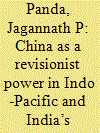

|
|
|
|
|
| Summary/Abstract |
Debate concerning China’s emergence as a revisionist power has taken a more direct shape under the Donald Trump administration in the United States. Such a debate is not as prevalent in India even though New Delhi began perceiving Beijing’s assertive rise long-ago with caution. India’s deductions of China as a revisionist power are drawn on its national security calculus and the anticipatory challenges it faces from China in the land and maritime domain that threatens the status-quo of the region. In other words, India's perception of China in Indo-Pacific is much more constructive, drawn on a dualist outlook of power-partner contention, that comes both as a challenge as well as opportunity.
|
|
|
|
|
|
|
|
|
|
|
|
|
|
|
|
| 3 |
ID:
178705
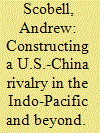

|
|
|
|
|
| Summary/Abstract |
The Washington-Beijing rivalry of the early twentieth century was neither pre-ordained nor an aberration. It was constructed as domestic constituencies in each country were socialized toward confrontation. Pro-cooperation coalitions, which had emerged in each country to support alignment against a mutually perceived Soviet threat, were undermined by the final chapter of the Cold War. Yet a simmering U.S.-China rivalry was subsumed by an unsustainable accommodation of mutual self-interest by Washington and Beijing during the first two decades of the post-Cold War era. By the 2010s, the rivalry had become quite visible as pro-cooperation coalitions in the United States and China had splintered and been supplanted by pro-confrontation coalitions. U.S. and Chinese geostrategic reassessments also contributed to the emerging rivalry.
|
|
|
|
|
|
|
|
|
|
|
|
|
|
|
|
| 4 |
ID:
178712
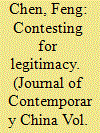

|
|
|
|
|
| Summary/Abstract |
‘Worker Representation’ (WR) originated as a spontaneous practice backed by workers’ collective actions in response to the failed role of trade unions. It allows workers to bargain with employers in a somewhat organized manner, thus facilitating the possibility of voluntary negotiations for dispute settlement. WR activists have sought to regularize the practice and establish its legitimacy in pragmatic, normative and cognitive terms. Yet WR poses a dilemma to the government, as it brings two divergent outcomes: it provides solutions to labor disputes and it inspires labor activism. As a result of its dual institutional logic of dispute resolution and stability maintenance, the government’s response to WR has oscillated between accommodation and suppression.
|
|
|
|
|
|
|
|
|
|
|
|
|
|
|
|
| 5 |
ID:
178715
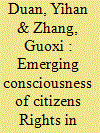

|
|
|
|
|
| Summary/Abstract |
This article explores the process and causes of the emerging consciousness of citizens’ rights in China. Using data from a nationally representative survey on the current state of fairness and justice in China in 2014, it presents an empirical study on the features of the generational variation of Chinese citizens’ emerging rights consciousness as well as the factors that contribute to the variation. Previous research has attributed the rise of citizens’ rights consciousness in China to democratization and political liberalization. In the absence of full democracy in China, however, findings from this article demonstrate that the forces of marketization can directly lead to the awakening of the rights consciousness among Chinese citizens. The article also finds that China’s urbanization process has promoted the generational variation of the citizens’ rights consciousness.
|
|
|
|
|
|
|
|
|
|
|
|
|
|
|
|
| 6 |
ID:
178700
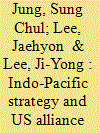

|
|
|
|
|
| Summary/Abstract |
Will the US-led Indo-Pacific strategy lead to an extensive alliance network against China? This article shifts focus to non-Quad Asian states—in particular, Indonesia, Vietnam, and South Korea—that face a strategic dilemma in the US-China competition and examines their positions regarding a rising China and the Indo-Pacific strategy. While reluctant to join the US strategy for the Indo-Pacific region, Asian middle powers now aim to tame, rather than contain, China despite their slight variations of response to the Indo-Pacific strategy. The US and its three partners—Japan, India, and Australia—have not been successful yet in recruiting new members to their coalition, mainly because of the declining hegemon’s (seemingly) weakened commitment to a liberal international order and the rising challenger’s (potential) opposition and punishment.
|
|
|
|
|
|
|
|
|
|
|
|
|
|
|
|
| 7 |
ID:
178711


|
|
|
|
|
| Summary/Abstract |
Although existing literature has stressed the influences of various factors on job performance, the influence of the perceptions of promotion opportunities on job performance is frequently disregarded in the majority of studies on public sector human resource management. Using the survey data from Chinese junior civil servants, the study revealed that perceptions of promotion opportunities can directly influence both task performance and contextual performance, and perceptions of promotion opportunities can strengthen task performance and contextual performance by the mediating role of job engagement. It was also indicated that perceptions of promotion opportunities were influenced by rank, supervisor-subordinate relationships, and promotion justice. Thus, the study developed a conceptual framework that included the variables laid-above to understand the mechanisms of the influence of perceptions of promotion opportunities on job performance.
|
|
|
|
|
|
|
|
|
|
|
|
|
|
|
|
| 8 |
ID:
178697


|
|
|
|
|
| Summary/Abstract |
The Quadrilateral Security Dialogue (‘Quad’)—a cooperative consisting of the US, Japan, Australia, and India—has re-emerged since 2017 after a decade of dormancy. After typologizing the minilateral security cooperation’s goals and its expansion, this article explains that the current Quad is an expanded minilateral cooperation of the existing various security bilaterals and trilaterals among its member states. This minilateral has increased its non-military cooperation, focusing on infrastructure-building to counter that of China’s Belt and Road Initiative in the Indo-Pacific region. It also examines how China has been responding to this line of the Quad’s economic responses, while China is cautious about the Quad’s security implications. It concludes with some predictions as to how this set of interactions is likely to influence the regional order.
|
|
|
|
|
|
|
|
|
|
|
|
|
|
|
|
| 9 |
ID:
178709


|
|
|
|
|
| Summary/Abstract |
In China, ‘residential surveillance at a designated residence,’ as provided by its current Criminal Procedure Law, is a special form of pre-trial detention designed allegedly as a non-custodial measure to reduce the rate of pre-trial custody. However, legal provisions concerning this measure tacitly allow suspects to be held incommunicado for up to six months without access to relatives and lawyers. The measure is also highly problematic in legal practice, because it often acts as a convenient tool for bypassing regular legal safeguards. ‘Residential surveillance at a designated residence’ is very similar to two other measures—‘shuanggui’ and ‘liuzhi’—with Chinese characteristics. The repressive detention measure stains China's struggle for the rule of law.
|
|
|
|
|
|
|
|
|
|
|
|
|
|
|
|
| 10 |
ID:
178696


|
|
|
|
|
| Summary/Abstract |
Unlike the common view that sees FOIP as a containment strategy against China, this article argues that Japan’s FOIP vision seeks to maintain an open and inclusive regional order that incorporates all regional countries into a common framework. To realize such a vision, Japan has strengthened its regional order-building efforts with other regional like-minded countries. However, such efforts have limitations in terms of the resource shortage, legal constraints, and the lack of regional consensus. Unless Japan can address these challenges, the FOIP would end up being a mere utopian dream, rather than a meaningful vision or strategy that can prevent the emergence of a Cold War and maintain an inclusive and rules-based order in the region.
|
|
|
|
|
|
|
|
|
|
|
|
|
|
|
|
|
|
|
|
|